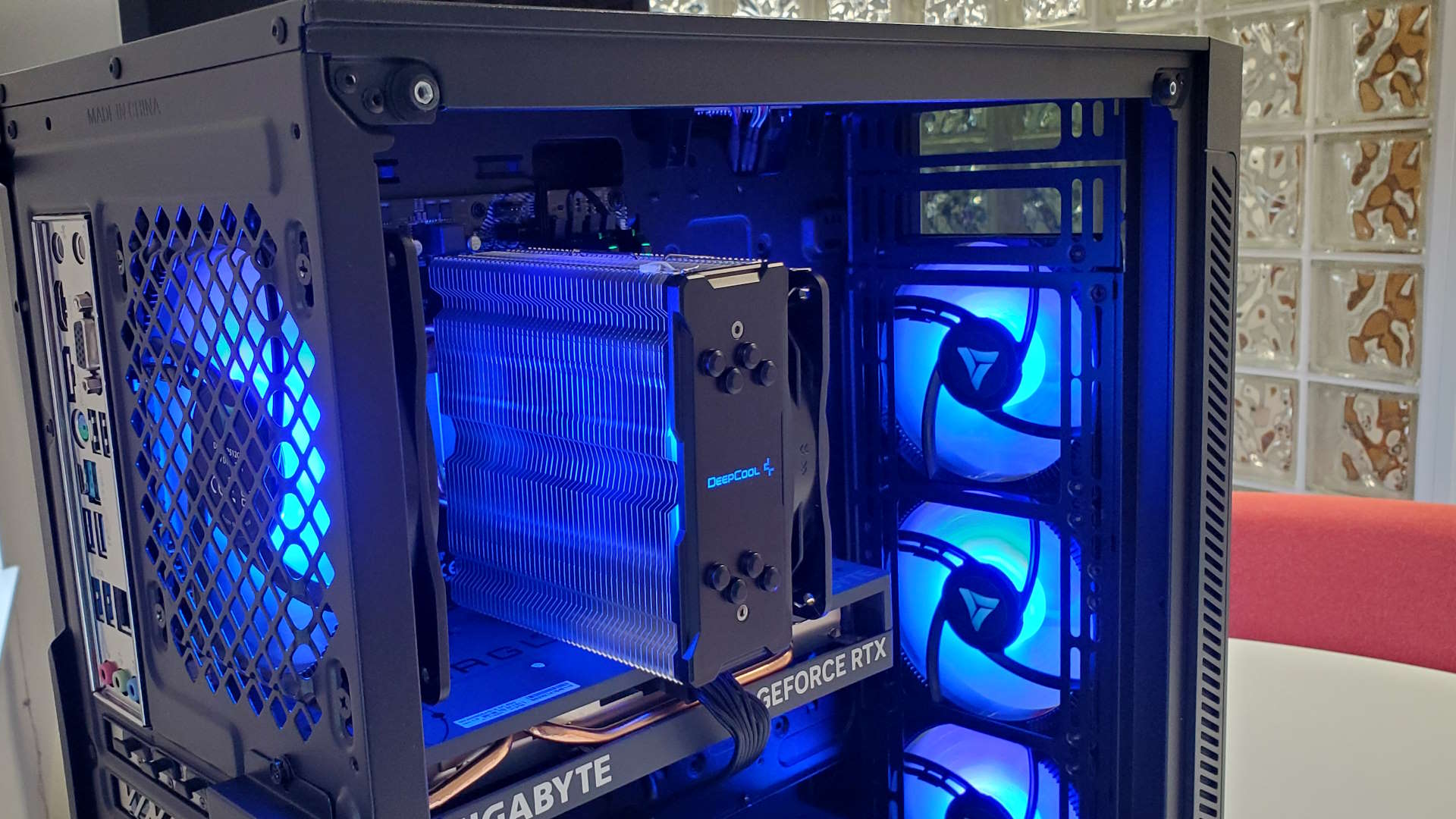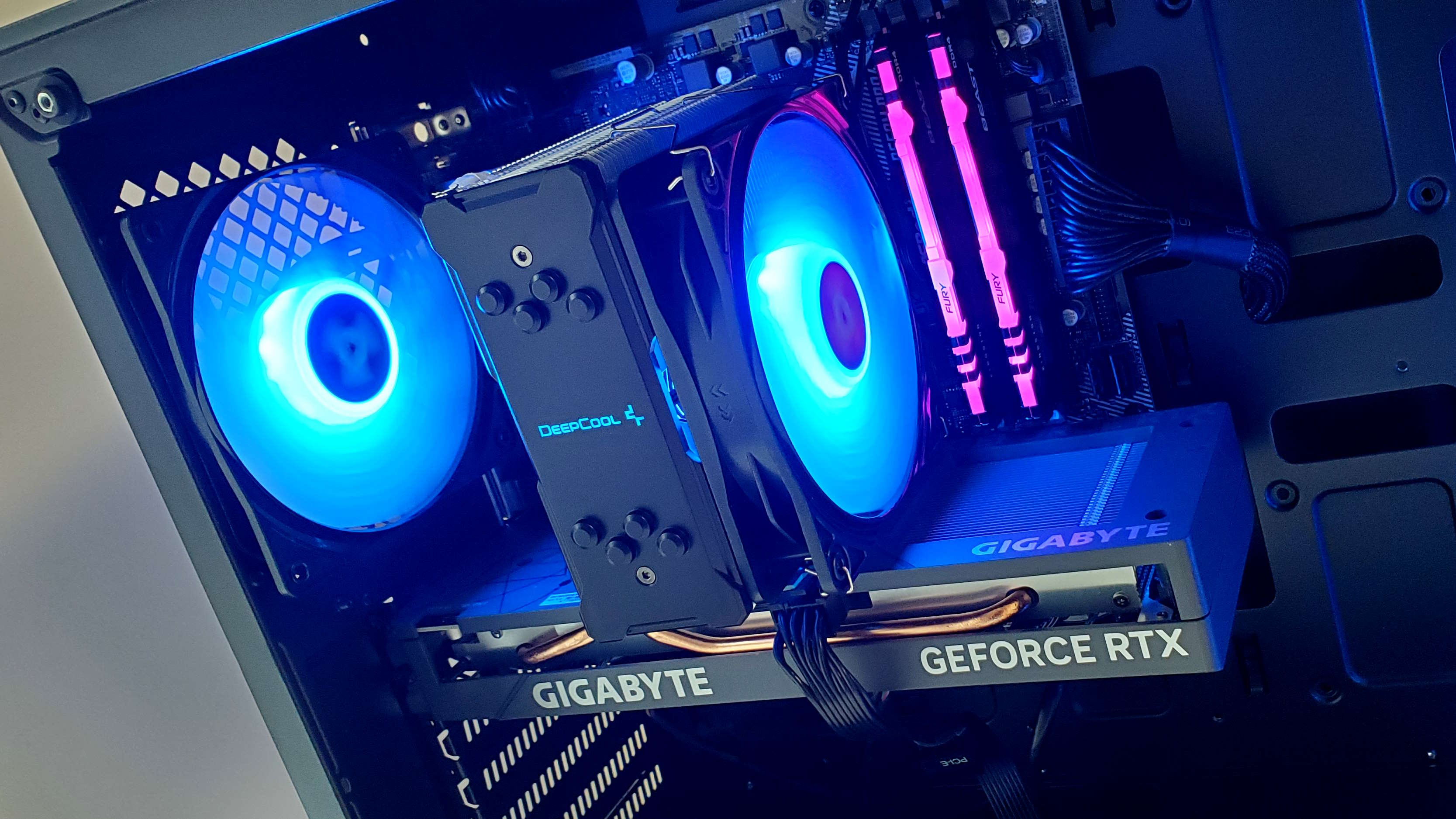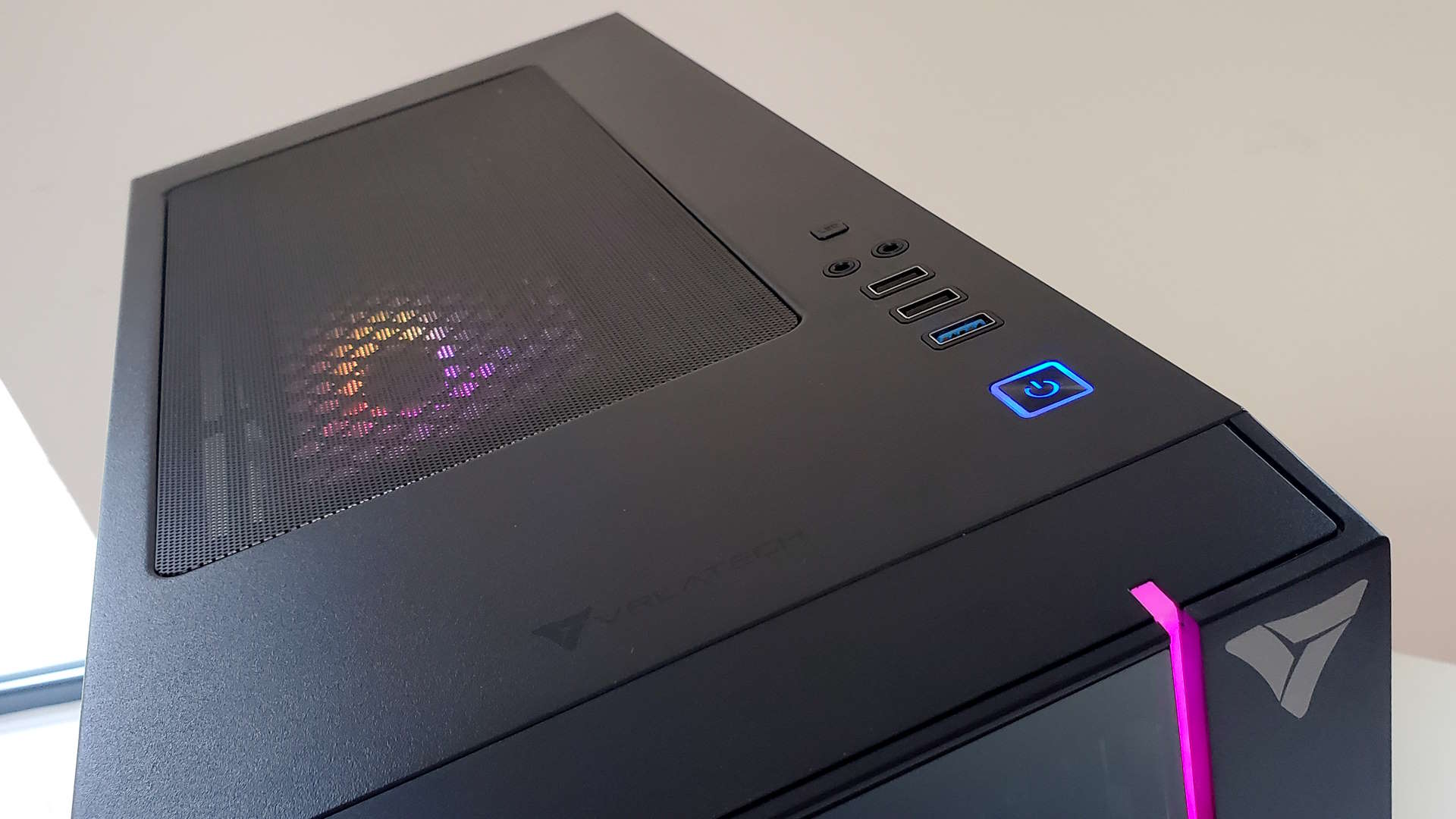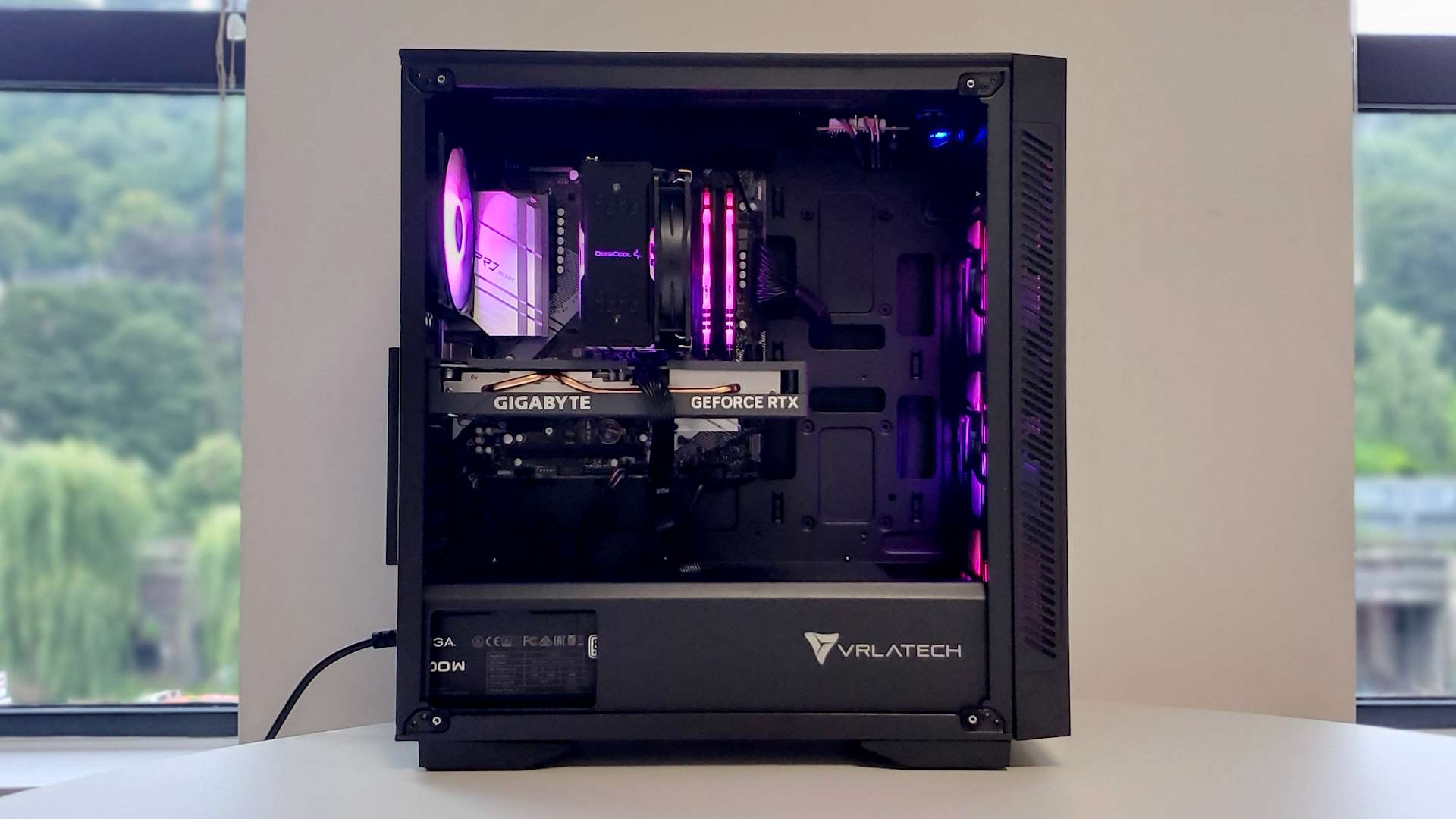Our Verdict
The VRLA Tech Apollo is a well-built, stylish, and more-than-capable entry-level gaming PC for 1080p and 1440p, even though it does cost a little more than it probably should.
For
- Good last-gen gaming CPU
- 1TB SSD
Against
- But it's not the quickest drive
- RTX 4060 Ti rigs are a similar price
PC Gamer's got your back
The VRLA Tech Apollo is the latest entry-level system from the boutique PC builder and aims to bring a high-level of build quality and style to those on tighter budgets. In order to accomplish this, the build is running one of the more respectable last-gen processors, the AMD Ryzen 5 5600X and the latest budget Nvidia Ada GPU.
While the RTX 4060 is far from the best graphics card from a raw technical perspective, it does feature many advantages over the likes of the AMD Radeon RX 7600 or the Intel Arc A770 in the mainstream gaming sphere. It all comes down to one crucial difference which Team Red and Team Blue can't quite measure up to: the inclusion of DLSS 3 and Frame Generation.
While Nvidia's latest budget card is no powerhouse by any means, but you can expect solid 1440p performance so long as you don't push the ray tracing too hard.
At this end of the PC market, it all ultimately comes down to the price-to-performance ratio on offer, and that's where the VRLA Tech Apollo's cheapest variant becomes a little less competitive. This configuration starts at $1,099—the same price as the likes of the Maingear MG-1 (Intel Arc A750) model. However, our review unit actually retails for $1,130 as it includes an extra fan in the mix.

Chassis: Deepcool Matrexx 55 V3 Tempered Glass Case
Fans: 4x 120mm RGB
CPU: AMD Ryzen 5 5600X
Cooler: RGB Deepcool Gammaxx
Motherboard: B550 AMD AM4
Memory: Kingston Fury Beast 16GB (2x 8GB) DDR4-3200
Storage: 1TB Gen 4 NVMe SSD
GPU: Gigabyte RTX 4060
PSU: EVGA 600W 80+ Power Supply
OS: Windows 11 Activated
Price: Base $1,099 (Final price $1,129.97)
That's fairly steep for a mainstream machine of this spec, as it's more than possible to find a prebuilt running the vastly more powerful RTX 4060 Ti inside for around this price point from other US builders.
With that said, the VRLA Tech Apollo spares no expense in the case and build quality. It certainly has the look of a more premium gaming PC, even with this humble hardware inside. The Deepcool Matrexx 55 V3 is far from the cheapest chassis you can build into, retailing for around $90, and rocking a tempered glass finish with three RGB fans on the front. This configuration also has that extra RGB fan at the back as well. It culminates in a machine which looks as though you could have built it yourself, which is also easy to open up with just four thumbscrews keeping the glass panel in place. This means it's fairly straightforward to upgrade, which is something that cannot be said for all budget pre-built rigs.
Considering that this build isn't exactly a powerhouse, there's no need for one of the best AIO cooler for CPUs, as this mainstream machine utilizes an RGB Deepcool Gammaxx tower cooler to get the job done. It looks pretty similar to the likes of the AMD Wraith Prism RGB cooler, and other once-bundled air coolers that you used to get with AMD processors.
The lighting is a good touch and adds to the aesthetic with the front RGB fans, the rear spinner, and this sizable block looking rather fetching when in motion. It's not quite one of the absolute best CPU air coolers, but you could do worse on the wallet-friendly side of things.
The decision to include a 1TB NVMe SSD in this build over a 512GB model—which is certainly more common at this price range—is something worth commending. However, it's clear from my testing the unmarked drive inside is a DRAM-less Gen 4.0 model due to its rather middling performance.
While still much faster than the likes of a SATA SSD, and blisteringly quick in comparison to the likes of an HDD of the same capacity, it isn't exactly pushing the boundaries of the now five-year-old technology. It's disappointing boutique build manufacturers are continuing to use old and outdated drives in their machines.

From our testing time with the VRLA Tech Apollo gaming PC, it's clear this is one rig best suited to 1080p, however, there is still some potential when upping the resolution to 1440p. It all depends on how well titles are natively optimized for the hardware, however, we found that this machine was more than competent in delivering a smooth and playable experience in the likes of Hitman 3, F1 22 and Far Cry 6 in these target resolutions.
Some issues start showing when running more graphically intensive titles on the system, though. You can see this with the less than ideal 30-41 fps range when benchmarking Total War: Warhammer 3 and Metro Exodus Enhanced Edition. They prove to be a struggle for the rig in the higher resolution, and don't even offer the most promising numbers in 1080p when running natively, either.
Make no mistake, these are still more than playable frame rates, but you'll want to utilize DLSS where possible in order to bump the figures up and provide a smoother experience. The RTX 4060 has support for DLSS 3 and what it's able to do on the hardware can make all the difference when the software supports it.

Well-optimized titles, such as F1 22, look great when enabling ray tracing and run well enough in both 1080p and 1440p. In Ultra RT mode, you can still expect an average of 83 fps in the former and 67 fps in the latter while benefiting from the likes of Ambient Occlusion, RT Shadows, RT Reflections, and RT Transparencies. All told, things are solid here, though far from exceptional. Older games in both 1080p and 1440p should look and run fine, but don't expect to be pushing 4K on this machine as the RTX 4060 just isn't up to the task, that's because this GPU has more in common with the older RTX 3050 spec-wise than the likes of the RTX 3060 Ti.
We absolutely loved the AMD Ryzen 5 5600X in our 90% review stating that it offered "Awesome gaming performance at a great price," and that's equally true almost three years later. The mainstream AM4 chipset may have since been replaced by the AM5 AMD Ryzen 5 7600X, but there's still merit in this Zen 3 processor yet. You can see that in the synthetic benchmarks listed above in industry-standard tests such as Cinebench R23, Geekbench 6, and 3D Mark's CPU profile. The six-core, 12 thread CPU isn't going to turn many heads but it gets the job done as far as gaming performance is concerned, especially factoring in the 65W TDP, so the air cooler should have no trouble keeping this chip on the chill side.

✅ You're after a well-built priced rig: The Apollo does just enough to represent as an almost competitively priced gaming PC, but it's certainly a well put together system.
❌ You're after something that punches above its weight: There are no surprises here, just an RTX 4060 machine with a standard backup spec.
❌ You can find an RTX 4060 Ti machine for a similar price: We have seen other prebuilt gaming PCs rocking the far superior Nvidia card for around the same price and that makes it difficult to recommend this build.
The VRLA Tech Apollo features 16GB Kingston Fury Beast RGB DDR4 RAM clocked at 3200 MHz and this memory kit does an admirable job. It's not quite the fastest nor the absolute best DDR4 RAM, but for a machine of this spec, it's good enough. You shouldn't encounter many issues with the 16GB capacity (2x 8GB) here as this is the standard for many of the best PC games. However, it's worth stating that you can pick up this kit for around $53, so doubling that should you need to in the future shouldn't be too difficult or expensive.
The 1TB NVMe drive inside the VRLA Tech Apollo is far from groundbreaking, but ultimately serviceable, capping out at around what's possible from Gen 3.0, but not even beginning to touch the sides of what some of the best SSDs for gaming can do. At a time where Gen 4.0 models, such as the stellar WD Black SN850X and Samsung 980 Pro are cheaper than ever, with 1TB models regularly far below $100 in the advent of Gen 5.0 SSDs, it's disappointing that we aren't getting faster NVMe models inside prebuilt machines.
As a frame of reference, these drives can achieve a blistering 7,300MB/s and can now be found for as little as $70 in 1TB. Considering the fact that Gen 4.0 NVMe drives were adopted by component manufacturers back in 2019, it isn't a glowing look to cheap out. Still, 1TB out of the box should be more than enough storage space to store and play some of the biggest upcoming games so you should have little to worry about when all is said and done.
The VRLA Tech Apollo largely achieves everything it sets out to do in providing an almost competitively priced and competent PC gaming experience in 1080p and 1440p but it doesn't really wow. Due to the nature of the RTX 4060 GPU inside, you'll want to keep DLSS 3 enabled where you can and stay on the mainstream resolution for the highest frame rates and most playable results. We'd have much rather had an RTX 4060 Ti machine for this money, and those are available if you shop around. That all makes it tough to recommend this Apollo rig.
The VRLA Tech Apollo is a well-built, stylish, and more-than-capable entry-level gaming PC for 1080p and 1440p, even though it does cost a little more than it probably should.
Aleksha McLoughlin is a very experienced hardware writer, having worked for multiple publications over the years. She has looked after buying guides, writes hardware reviews, news, and features and has managed the Techradar Gaming hardware team in a previous role. Before joining TRG she was the Hardware Editor for sister publication GamesRadar+ and she has also been PC Guide's Hardware Specialist. She has also contributed hardware content to the likes of Trusted Reviews, The Metro, Expert Reviews, and Android Central. When she isn't working, you'll often find her in mosh pits at metal gigs and festivals or listening to whatever new black and death metal has debuted that week.



